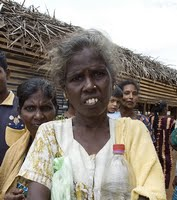Last month, the Indian central government abruptly ended days of violent protests by carving out a federal state for the Telangana region of Andhra Pradesh. In an effort to end a five-decade-long internal conflict, the world's largest democracy ceded a state for the greater good of stability and governance. India's war-weary neighbor, Sri Lanka, would do well to take a page from New Delhi's playbook as it looks to foster peaceful relations with its own minority Tamil population.
The Sri Lankan government must take advantage of its recent military defeat of the Tamil Tigers insurgency (LTTE) by negotiating for political inclusion of the Tamil people via a federal system. Previously, the government had agreed to a decentralization of power for the Tamil population in exchange for the disarmament of Tamil rebel groups, as per the Indo-Lanka Accord of 1987. The accord served as the basis for the 13th amendment to the Sri Lankan constitution, which devolved power through provincial councils, but failed to provide substantial local governance capacity. The Tigers' subsequent unwillingness to disarm ultimately doomed the accord, and today, even in the absence of violence, problems persist.
Sri Lanka now faces governance challenges as it stands on the brink of resettling hundreds of thousands of internally displaced Tamil people back into mainstream society. This community -- like the Telangana people in India -- has deep socio-economic grievances stemming from years of government neglect. Tamil refugees will return to destroyed homes and communities that lack basic infrastructure, but simply building them houses will not suffice. The island nation's stability will ultimately be determined by how well it politically integrates its Tamil minority. Creating a federal state would give Tamils a vested interest in pursuing a peaceful political solution, and ensure that their grievances are heard. Failure to achieve a meaningful and stable accommodation will leave Sri Lanka at the same crossroads it faced over three decades ago.

